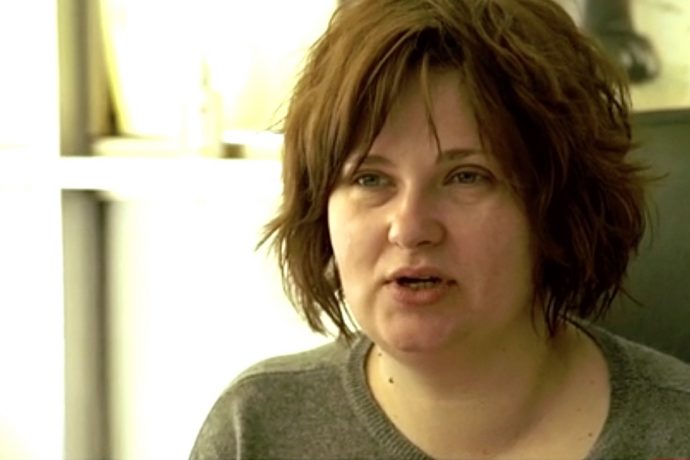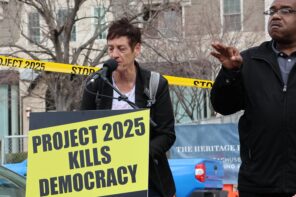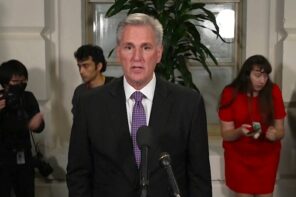Social conservatives from around the world gathered in Brussels last week to ask each other, “How far can we get?” The meeting was convened by the Political Network for Values, which provides a setting for activists to meet with like-minded legislators and plan strategy on issues like abortion, marriage, and religious freedom.
Meanwhile, LGBTI and human rights experts from more than 25 countries gathered in Bangkok to reflect on the 10 years since a group of activists articulated the Yogyakarta Principles on the application of international human rights law to questions of sexual orientation and gender identity.
The U.S. Commission on International Freedom released its 2017 annual report. It was the first report in which Russia was classified as a “country of particular concern,” defined as a country whose governments engage in or tolerate “particularly severe religious freedom violations that are systemic, ongoing, and egregious.” So far, Putin’s increasing suppression of non-Orthodox religions has not noticeably dimmed the enthusiasm with which U.S. anti-LGBT activists like Brian Brown have cultivated ties to Putin’s anti-gay allies.
ARC International published a reflection on the 61st U.N. Commission on the Status of Women, which was held at the end of March. As we have noted, the U.S. delegation included representatives of the Heritage Foundation and C-Fam, which works to prevent international recognition of or support for the rights of LGBT people. Erin Aylward, author of the ARC analysis, had this to say about “the rise of the religious right” within the CSW:
The CSW has become a space in which a formidable number of Christian right-wing organizations network and actively work to try and roll back pre-existing international agreements on sexual and reproductive health and rights and recent multilateral SOGI gains. These organizations—the majority of which are US-based – have grown increasingly sophisticated in spreading their activism globally and in engaging youth (particularly from Latin America) in their mobilizing. During this year’s CSW, these organizations arguably had three main targets: abortion, comprehensive sexuality education, and trans rights. For example, the International Organization for the Family, in partnership with the Spain-based CitizenGo, and the US-based National Organization for Marriage co-organized a tour for an alleged “free speech bus” emblazoned with transphobic messages. While it’s not entirely clear how much of an influence these organizations have been able to yield on state delegations, their presence has certainly contributed to making the CSW an unsafe and unwelcoming space for some LBTI folks and SRHR activists. Due in part to these organizations’ presence, very few sex workers’ rights organizations choose to participate in the CSW, deeming it to be too hostile and unproductive a space.
And so, the Agreed Conclusions for this year’s CSW can be considered, on the whole, beneficial and productive. However, the broader context in which these negotiations took place demonstrate some alarming developments for those committed to advancing a rights-based agenda in general, and a SOGIESC or SRHR-focused agenda in particular. In terms of next steps, it’s clear that women’s rights and LBTI rights-focused organizations have an important role to play in protecting civil society space, holding states accountable to previously-negotiated language, and resisting the encroachment of the religious right within these UN spaces and among official delegations.
Europe: Religious Right argues against Court of Justice mandating marriage recognition
The European Court of Justice is considering a case brought by two men, a Romanian and an American, who were married in Belgium but denied recognition of their marriage when they tried to relocate to Romania. They have argued that the refusal violates their freedom of movement within the European Union. ADF International, the global arm of the US-based religious right legal group Alliance Defending Freedom, urged the court not to rule in the couple’s favor, which it said would amount to “EU-wide imposition of same-sex marriage.”
Italy: Conservative religious activist charged with taking money to squelch human rights inquiry
BuzzFeed’s Lester Feder and Alberto Nardelli reported that Luca Volontè, an Italian anti-abortion and anti-LGBTQ activist with close ties to American Religious Right figures “is under investigation for allegedly accepting millions in exchange for helping muzzle Europe’s top human rights body.” Volontè, who heads the Novae Terrae Foundation, has been accused by prosecutors of taking money from the government of Azerbaijan in return for helping to defeat a European human rights resolution that would have condemned the Azeri government for holding political prisoners. Volontè has denied the charges, and his friend Brian Brown, who Volontè helped launch the International Organization for the Family in December, dismissed the investigation as “a political witch hunt.”
Colombia: Human rights activists warn against referendum on adoption
Bill 220 of 2017 would establish a national referendum on a constitutional amendment to ban same-sex couples and single people from adopting children, something they can legally do now thanks to a Constitutional Court ruling in 2015. A group promoting the initiative cites a number of studies to support their argument that the initiative is needed to protect the best interest of children; among them is the widely discredited New Family Structures Study by Mark Regnerus. Their use of other studies has also been publicly challenged.
From Human Rights Watch’s April 28 letter to Speaker Pinto [citations removed], which notes that the bill has already passed the Senate:
Proponents have also argued that they seek to limit adoption to heterosexual couples because, “as Christians, [they] recognize God’s original design of a family formed by a man and a woman.”[10] But international law expressly forbids states from discriminating on the basis of religion –something that Human Rights Watch has consistently criticized in countries as diverse as Iran, Saudi Arabia, Russia, and Nigeria, among others. International human rights law supports the principle that everyone should be able form a family as he or she sees fit.
Guatemala: Evangelical leaders back ban on marriage equality, prison sentences for abortion
Legislation banning same-sex couples from getting married was introduced in Guatemala; the bill would also imprison both doctors and women involved in an abortion in which the pregnancy did not put the woman’s life at risk. A woman could receive five to 10 years in prison, while a doctor could be sentenced to six to 12 years—up to 25 years if a woman dies as a result of an abortion. The bill also includes a restriction on public and private educational institutions from promoting “gender ideology” and a provision that “no person may be prosecuted” for not accepting “sexual diversity.”
Deputy Anibal Rojas Espino, who introduced the legislation, declared, “We believe in a country with values firmly established in God and in Pro Life (not abortion) and in Man – woman marriages, as our original design is.” (Translation via Google).
The legislation is supported by evangelical leaders. The Guatemalan Association of Secular Humanists said that the so-called northern triangle in Central America already has the highest rate of violence against transgender people in Latin America and that the legislation “puts them in an even more vulnerable position.”
Russia: More calls for investigation of killings in Chechnya, but is Putin a paper tiger?
CNN’s Matthew Chance reported from Moscow on the “terrifying” death threats made by Muslim clerics against Elena Milashina, the journalist who broke the story about a wave of detention, torture and killing of gay men in Chechnya. More than 20 member nations of the Equal Rights Coalition urged Russia to investigate the reports and hold those responsible accountable. The U.S. Holocaust Memorial Museum expressed “great concern,” saying, “The Holocaust teaches us what can happen when state-sponsored, group-targeted violence is allowed to go unchecked.” But on May 1, police in St. Petersburg detained LGBT activists who were trying to raise awareness about the persecution in Chechnya.
Chechnya’s leader Ramzan Kadyrov, who has denied that there are gay people in Chechnya, and suggested if there were, family members would take care of them, reportedly said there were plans to “eliminate” the gay community before the start of Ramadan on May 26th.
On April 24, the Washington Post’s editorial board complained that Russian President Vladimir Putin’s response has been essentially to shrug:
CHECHNYA’S STRONGMAN, Ramzan Kadyrov, hardly skipped a beat when it was revealed that his security forces were kidnapping and torturing gay men in the republic. Instead of investigating and punishing those who inflicted the horrors, Mr. Kadyrov, a violent provincial boss who enjoys the blessings of Russian President Vladimir Putin, immediately went after the Moscow newspaper that brought the situation to light. Reporters have been threatened and denounced, and forced to flee Russia. …
Mr. Kadyrov appears to enjoy a certain impunity. His men are suspected of carrying out the murder of opposition leader Boris Nemtsov in 2015, but somehow Russian law enforcement is unable to bring to justice whoever ordered the killing. …
In an open and free society, this chain of events would be cause for alarm: secret torture chambers, runaway authority, intimidation of the press. But Russia is not free, and Mr. Putin hardly seems perturbed. He tolerates brutality and coercion as instruments of state power, deaf to the cries of anguish from its victims.
In a commentary for the European Council on Foreign Relations, Anna Arutunyan explains “Why Putin won’t get tough on Kadyrov.” Recounting a recent meeting between the two leaders, Arutunyan writes:
The sum total of the message demonstrated that Putin has no leverage over Kadyrov: that Russian laws do not work in Chechnya, but at least Chechnya is doing its bit to fight Russia’s wars (even if the battalion was merely there for protection, not military action), so it deserves every ruble of Russia’s tribute (and Kadyrov made a point of asking Putin for “federal assistance” in their meeting) and every ounce of its de facto autonomy. …
When Chechen prosecutors launched an investigation into the alleged crackdown on gay people, it was clear from the start that fear and honour codes prevented Chechen men, whether gay or not, from reporting abuses to the same authorities that colluded in persecuting them. …
Unsurprisingly, fighting the kind of radical social conservativism that leads to the persecution of gay people and forced marriages is not exactly Putin’s top priority, given Russia’s pivot to traditional values. One could even suppose that the Kremlin derives a sort of “dark power” from these abuses, which make its own overtures towards traditionalism tame by comparison. But there is also no advantage for Putin in appearing to be not in control.
In light of Putin’s lack of action in this case and with regard to the killing of opposition leader Boris Nemtsov, Arutunyan suggests that Putin has little actual power over Kadyrov:
What if the two wars that Russia fought against Chechen separatists were not, after all, victorious, and, by some unspoken pact, Kadyrov is merely exercising de facto independence?
After all, Kadyrov’s gaudy displays of tradition trumping law may be an important mechanism of keeping separatism at bay by signalling, to the constituencies that matter, that Chechnya has something even better than independence: its traditions trump Russian law, while 81 percent of its budget is funded by federal subsidies.
South Korea: Presidential candidate woos conservative Christian voters with attack on homosexuality
Associated Press reports that presidential front-runner Moon Jae-in, a liberal candidate and former human rights lawyer, “outraged persecuted sexual minority groups by saying during a television debate that he opposes homosexuality.” According to AP, Moon made the comments in response to a conservative candidate “who argued gay soldiers were weakening the country’s military.”
The New York Times cited critics who called Moon’s statement “a stark tactic to win support among conservative voters.”
In South Korea, the rights of lesbian, gay, bisexual and transgender people are a largely taboo and politically unpopular subject. In recent years, powerful right-wing Christian groups have intensified a campaign against homosexuality, scuttling a bill that would have given sexual minorities the same protection as other minorities.
The Times notes that the comments come at a time when human rights advocates have charged the South Korean military with a campaign against gay servicemembers:
The army declined to provide details of its investigation. It insisted that it was not cracking down on gay soldiers; instead it said that it was trying to root out sodomy and other homosexual activities, which right-wing Christian groups have called a growing blight on its readiness to fight North Korea’s 1.2 million-strong military.
But in the past week, evidence has emerged to support the allegations by gay soldiers that investigators flouted the army’s own regulations on how to treat gay service members by preying upon the soldiers’ fear of shame and abuse if they are outed in the military. Analysts and veterans said bullying, hazing and sexual violence were chronic problems.
Zimbabwe: Human Rights Commissioner praises Mugabe opposition to ‘unbiblical’ practices
Petunia Chiriseri, a preacher and a member of the Zimbabwe Human Rights Commission, sparked protest after she “showered praises on President Robert Mugabe for resisting the imposition of ‘un-cultural’ practices on the country by foreigners.” According to New Zimbabwe, Chiriseri had been asked to give a prayer during celebrations of the country’s independence:
But the visibly excited official went far beyond a prayer, giving a lengthy sermon which was full of Mugabe praises and never short of its own share of controversies.
Pastor Chiriseri, sworn into the State rights watchdog in 2016, thanked Mugabe for “consistently acknowledging the power of gospel of our Lord Jesus Christ”.
She also blasted unnamed nations that now worship Satan “under the so called multi-sectoral approach and freedom of worship”.
In remarks that were apparently directed at gays and lesbians, Chiriseri thanked Mugabe for his firm stand against “unbiblical” practices.
“As church, you took a firm stand against unbiblical, un-cultural, unacceptable practices which foreigners…seek to impose upon Africa,” said Chiriseri to President Mugabe, a rabid critic of gays.
“As the Church, we applaud you for your courage which may have cost you and our nation Zimbabwe the popularity which we once may have had.
“But it preserved our nation and family values of which we are proud of because they bind us together and they make us who we are.”
Brazil: Church baptizes children of gay parents, conservatives decry ‘surrender before the Zeitgeist”
A self-described “polemical Catholic Royalist blog” complained about the baptism in the Cathedral of Curitiba of adoptive children of gay parents. “The media gave overall impression that the Church had changed its attitude to homosexuality (tacitly). There was no contradiction or a critical word about the life of the ‘parents’ from the Church leaders obliged to say something. The conservative blog charged church officials with “surrender before the Zeitgeist.”
Fiji: Anglican Archbishop ready to talk about LGBTs and marriage
The Fiji Times reports that Archbishop Winston Halapua, leader of the Anglican Church’s Diocese of Polynesia, said the issue of marriage equality is “challenging” but will be discussed at this week’s general synod.
Norway: Anti-gay Nazi rally planned for the summer
The Nordic Resistance Movement, identified by The Nordic Page as a Nazi organization active in Sweden, Finland, Norway, Denmark and Iceland, has applied for a permit to hold a rally in Fredrikstad this summer with “Destroy the homo lobby.” as a theme. The group also opposes immigration and calls for the establishment of a single Nordic state outside the EU.
Saipan: Chinese same-sex couples traveling to U.S. commonwealth to marry
The Saipan Tribune reports a boom in same-sex couples getting married on the U.S. protectorate of Saipan, an island in the Pacific Ocean that is part of the Commonwealth of the Northern Mariana Islands. A majority of the couples being married are Chinese who come to Saipan as tourists.
Canada: Trans legislation introduced in Yukon
The government of the Yukon Territory introduced a trans rights bill, making it the final jurisdiction in Canada to act on trans rights legislation. According to DailyXtra, all provinces and territories except New Brunswick have passed legislation and a bill in New Brunswick is awaiting its final reading. Legislation is also pending at the federal level.
France: Jean-Marie Le Pen unhappy with eulogy by partner of slain policeman
A gay policeman killed in Paris last week by a man carrying a note defending the Islamic State, was eulogized by his partner. On Friday, Jean-Marie Le Pen, founder of the far-right National Front and father of the party’s current presidential candidate Marine Le Pen, criticized the surviving partner’s speech for having “exalted” gay marriage.
Hong King: Court orders partial recognition for same-sex couple married in New Zealand
A civil servant who married his same-sex partner in New Zealand won a court ruling against the government to obtain civil service welfare benefits for his husband. The same ruling denied the couple’s quest to file taxes jointly.





